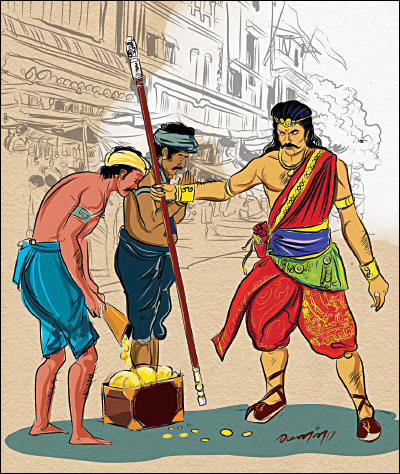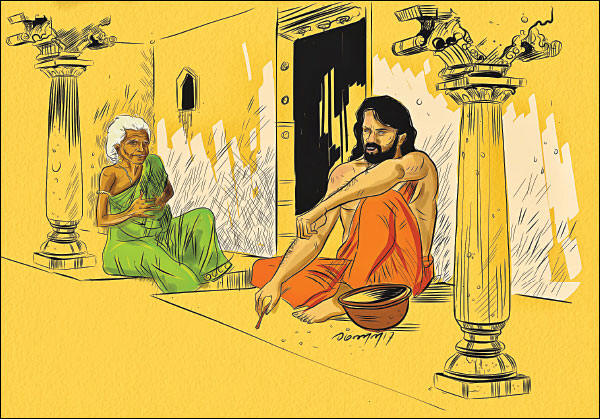சக்தி விகடன்
Sakthi Vikatan-
23 May, 2017
Author: A.K. Perumal
Images: Ramanan
‘No more begging.’ That was his decision. He saw clusters of
Sundaikkāi (Pea aubergine) fruits hanging from the branches. He took
many clusters and saved them in his cloth.
At a short distance he saw Moringa tree. He caught hold of
the branch, bent it and harvested the leaves and the fruits. Now he had
a heavy load of the produce in his cloth.
சுண்டைக்
காய்ச்
pea aubergine, solanum
torvum
முருங்கை மரம்
=
Moringa tree =
Moringa Oleifera
= Drumstick tree
Carrying the produce on his shoulder, he walked towards the city.
Kulasekhara Pandian was not in Valliyur. The town without a head is like
a child without his or her mother. There is no ruler. The officials took
over the reign of the city. What is said and done by the king or the
officials is the law. There is tax on everything. There was a widespread
corruption. No one was any less assertive than the other. The officials
acted with reckless abandon.
When he entered the town, the city police officer noticed his load on
the shoulder. “Hey you, come here. What is this?”
“Master, some drumsticks, greens and pea-berries. I am entering the town
to sell these produces.”
The policeman put his hands inside his bundle and took for himself the
good drumsticks. His authority allowed him to plunge his long hands. The
town official blocked his path and confiscated half the berries. When he
tried to sell the rest of the produce, a woman accosted him, grabbed his
parcel and walked away.
“Mother… You are taking away everything with no spoken word. Can you
give me some money”?
“Hey… You are asking for money from Pavalakkodi, (the maid in the house)
of the head of guards of the fort. You will be chased out of this town.
Remember that. She kept on
walking away from him. An elderly man identified her as house worker for
the guard of the fort. There will be trouble, if you demand money from
her.
He was not willing to go on begging rounds. Again, we went back to the
forest. The forest invited with smiling face. On searching, he found
fruits. Watching the foraging behavior of the rabbits, he dug up root
vegetables and ate them. Though his hunger subsided, his mind was
perturbed by the heartless behavior of the townspeople.
Thought of selling firewood came to his mind. He took the tree limbs and
sticks in a bundle to the town. There was an invitation from the
authorities. He sold only part of his collection. The income tax officer
took half the earned money. Inside the fort, the wife of the high
official took the rest of the firewood free of cost without his
permission. Not just that. She demanded him to bring firewood the next
day.
He was in turmoil. Fatigued, he sat on the raised platform in the fore
of a house. Aloneness…
usurping authorities…What to do next… confusion… He was all upset. He
eyes teared without his awareness.
It was the house of an old woman. She had no one to call as relatives.
She came out, saw the man and enquired about him.
He narrated the whole story of his experience since his arrival
at Valliyur.
The old woman with closed eyes cogitated about him.
She said, “Stay here.” She began cooking. He ate the ambrosial
food, prepared by an old woman. Aromatic Kuzhambu-Dal and vegetable
stew. Hot Samba rice.
It was many days ago since he ate such food. With no shame,
reservation or false pretense he ate beyond his satiation and fullness
of his stomach. He slept on the raised platform.
Next day, he went into the woods. He gathered firewood and vegetables
and gave them to the old woman. He said to the old woman, “I need only
twice a day meals (Kañchi = gruel). Daily, I will bring vegetables and
greens from the forest. You take the money by selling them.” That was
the agreement he made with her. Those were the days he was free of
hunger. He had mental tranquility. The mind and body gathered strength.
He cut a straight stick in the forest and a carpenter installed metal
ferrule. His thinking was the staff will help him navigate in the
forest. He was a well-built robust individual. Now he has a weapon on
his hand. The staff helped him to chase the animals away. People treated
him
with deference and
moved away from him.

The old woman enquired of him, “Who are you? Where do you come from?” He
gave a short narration of his life story. He was from a rich family.
When his parents died, his relatives usurped his wealth and chased him
out. Hearing the story, the
old woman gave him some money and said, “Have your hair coiffed, shave
off your beard, take a shower and come back.” When he came back, the old
woman invited him to come inside the house. Giving Tanjore silk clothes,
she asked him to don them.
She gave him gold ornaments to wear. He felt he was no orphan anymore.
Importantly he was not a beggar. By appearance, he was a prince. No… He
was the prince himself. He went around Vallyur with his imperial staff.
Strong body, weapon on hand, and majestic appearance: What else does one
need? He was jumping for joy. He desired to threaten someone (out of
curiosity and to learn of their reaction).
The first his eyes caught was the headman of the village, who shook and
shivered hearing his authoritative voice. The headman paid homage to
him. He was ecstatic to see his threats had the intended effect. Those
who feared his threats gave him money. He understood these people do
knuckle-rapping of the head when others bend. When someone is ramrod
straight, they bend. He
made it a vocation to grasping at money. The corrupt officials on the
take sent to him and paid money.
Considerable money accumulated.
He built a house.
He built a house for the old woman who supported him. All aspects of
daily life involving well water, funeral, wedding… generated revenue for
him. Money was pouring like a torrent. If someone walks with a vigorous
swing of the arms, the walker pays revenue. That is his law.
All came under the strongman’s rule: the law of the jungle.
Hand-swinging tax was his creation. Besides his natal name, he earned
the name, ‘Vīṇāthi
Vīraṉ.’
It means ‘a Worthless Fellow.’ Time does not revolve one way. It
happened to Vīṇāthi
Vīṇaṉ.
Kulasekhara Pandian living in Madura made an unexpected visit to
Valliyur. He learnt that the staff bearer was the tax collector in
Valliyur. The officer
bearers feared him, he learnt. Pandiyan sent guards to scoop him up and
bring him in person to him. They arrested him and brought him before
Pandiyan. Royal enquiry began. Seeing him, the king felt compassion. He
felt that the unauthorized tax collector must have a reason for his
violent behavior. The enquiry began with a soft approach. The king’s
voice seemed to have magical effect on the staff bearer.
Vīṇaṉ
(the staff bearer) poured out his life story.
“O king, I sold fresh produce, firewood… Your men exploited and robbed
me. I could not make an honest living. That is why I descended into a
life of violence. Whatever I accumulated, I will surrender to you, said
Vīṇaṉ.
The king understood the prevailing affairs of the state. The king
appointed him to a position of authority telling
Vīṇāthi
Vīṇaṉ
he could keep his possessions. (A note says it was a ministerial
position.) Vīṇāthi
Vīṇaṉ
changed his lifestyle. Valliyur changed too. The Pandiyan fortress
became a sanctuary for poor people. Though
Vīṇāthi
Vīṇaṉ
one day will be no more, his legacy lived. Obtaining boon from Siva,
people believe, he became a deity.
The traditional belief and news are that Vīṇāthi
Vīṇaṉ
built Sokkanāthar Temple in Valliyur.
Vīṇaṉ’s sculpture is
seen even to this day on the Prākāram (circumferential walkway around
the temple). It is a majestic form of the gallant. It is believed he was
the object of worship. In the
great temples where Pandiyan and Vadivīcchu Amman are worshipped, Vīṇaṉ
remains an associate deity.
Vīṇāthi
Vīṇaṉ
appears in the stone image in the Prakāaram in the temples of Nāgarkoil,
Kalainagar, and Thamburān. On
festival days, Puja and divine folk dance take place. There is a record
in the 50s of lending, buying, land tax payment and related resolution
of problems of people supervised by Vīṇāthi
Vīṇaṉ.
He was the god who made the people whole.
The story moves on…
Presentation: Balu Sathya.

